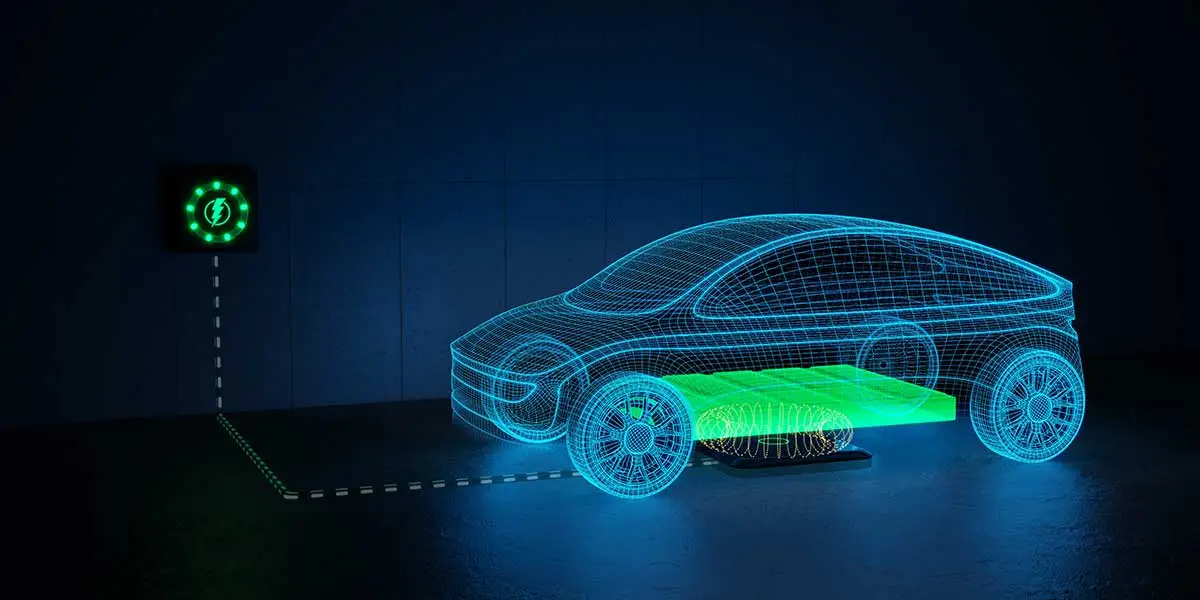
Jul 14, 2023
Blog Energy & Sustainability , Materials Wireless Charging for Electric Vehicles is Taking Off
Electric vehicles (EVs) are the low-emission, environmentally friendly vehicles of the future. Most EVs are charged by either plug-in or wireless power transmission methods. The wireless technique is gaining traction, favored for being dynamic and enabling EV batteries that are both lighter and smaller.
The benefits of wireless charging are stimulating mammoth market growth. BCC Research estimates that the global wireless charging market for electric vehicles will reach $284.3 million by 2027, with a CAGR of a staggering 67.9% from 2022 to 2027.
Dynamic wireless charging lowers the size of the car battery, which is currently a considerable size in most electric vehicles. Wireless technologies allows for batteries that are both lighter and smaller, which also cuts the entire cost of the electric vehicle due to these changes. Given these benefits, several car OEMs, including Nissan Hyundai and Tesla, are investing extensively in wireless technology for electric vehicles. But overall, very few brands have wireless technology built into their models. Nonetheless, the benefits of wireless charging are anticipated to support wireless EVs’ revenue growth.
Governments are funnelling investments into EV production, which is ultimately launching the take-off of wireless charging. In many nations, the development of wireless charging is now supported by incentives and government support for electric vehicles. Full autonomy, the lack of a charging station, the decreased risk of an electric shock to the driver, and smaller battery units are the main benefits of wireless charging. The general population can work for longer periods of time because they do not have to wait for their cars to charge. This increase in productive hours contributes to a country’s gross domestic product (GDP) growth. The absence of or reduced requirement for a charging station in dynamic charging is another important factor supporting the installation of wireless charging in urban settings where space is at a premium.
BCC Research’s latest report dives into the industry outlook for wireless charging in electric vehicles. Delivering five-year forecasts, regional analysis, and more, the report is an invaluable accomplice for those navigating this booming market.
In Marlow, Buckinghamshire, the first wireless technology trial was successfully completed in 2021. Sweden tested a wireless charging road successfully in 2021 in a bid to modernize transportation processes and hasten the transition to electric mobility. A dynamic wireless charging system was recently installed on a 1.65-km public road in Gotland, Sweden, by the Israeli business ElectReon. On this smart road, a completely electric truck was charged. Detroit’s first wireless charging road system will be constructed through a deal finalized by the state of Michigan. Detroit’s wireless charging road system will use ElectReon’s dynamic charging technology to provide on-the-go charging for vehicles with batteries. The project is expected to be fully operational by 2023.
Switching from plug-in to wireless charging technology can be costly. For power transfer with a power control unit (PCU), the wireless charging method for electric vehicles needs both transmitter and receiver coils. The base charging pad (BCP) houses the transmitter coil, while the vehicle charging pad (VCP) houses the receiver coil. The total cost of an installed aftermarket wireless charging system for a home is between $2,500 and $3,000. The cost of an electric vehicle increases when wireless charging technology is used in the vehicle. Consequently, this raises the cost of wireless electric vehicle charging.
On the other hand, the cost of wireless charging technology will decrease due to the rising demand for wireless charging and the widespread production of electric vehicles. The electric vehicle industry is still in the introduction stage with regard to wireless charging technology. However, it is anticipated that future car models from most automotive OEMs will feature this technology. Therefore, it can be deduced that the high cost of upgrading to wireless charging technology will be mitigated when considering economic climate and scale-induced economies of scale.
Autonomous or independent charging is merely a robotic arm that can automatically charge a vehicle without a person’s involvement. In August 2018, Tesla introduced a metal snake robotic arm that could be added to Tesla’s supercharger stations. Graz University of Technology researchers initiated a project and built the prototype of a robot-controlled, fast Combined Charging System (CCS) for EVs. This project has funding from many automotive companies, including BMW AG, MAGNA Steyr Engineering, KEBA, and the Austrian Association for Automotive Technology. The robotic arm can plug in the cable from any EV compatible with the CCS station with the help of a computer vision system. Self-driving cars require wireless charging pads, which are also an autonomous form of charging.
Membership with our research library grants access to all reports published within your chosen category. Explore our fuel cell and battery technologies category and enquire today to find out more.

Olivia Lowden is a Junior Copywriter at BCC Research, writing content on everything from sustainability to fintech. Before beginning at BCC Research, she received a First-Class Master’s Degree in Creative Writing from the University of East Anglia.

Electrical switches—devices that control the flow of electricity—are the backbon...

Biophotonics: Technologies and Global Markets (PHO024B)

As the world accelerates toward net-zero emissions, hydrogen, and ammonia have e...

We are your trusted research partner, providing actionable insights and custom consulting across life sciences, advanced materials, and technology. Allow BCC Research to nurture your smartest business decisions today, tomorrow, and beyond.
Contact UsBCC Research provides objective, unbiased measurement and assessment of market opportunities with detailed market research reports. Our experienced industry analysts assess growth opportunities, market sizing, technologies, applications, supply chains and companies with the singular goal of helping you make informed business decisions, free of noise and hype.